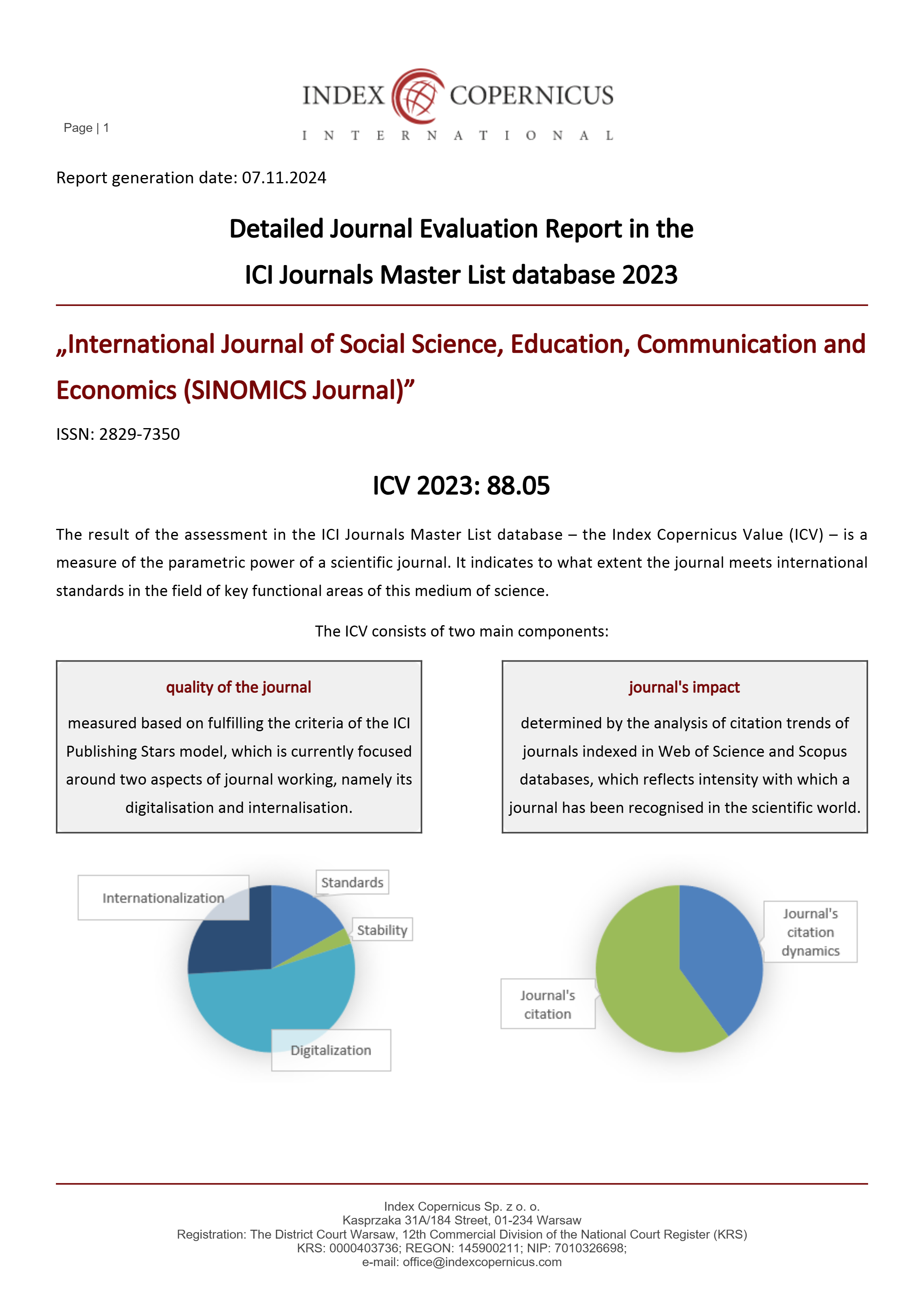The Relationship between Emotional Maturity and Self-Efficacy With Career Maturity in Class XI Students of SMAN 1 Jakarta
Main Article Content
Devega Maharini Oktavia
Dicky Kurniawan
This research is a quantitative study which aims to examine the relationship between emotional maturity and self-efficacy and career maturity in class XI students at SMAN 1 Jakarta. The research population was 290 students of class The instrument of this research uses 3 scales, namely the Career Maturity scale, emotional maturity and self-efficacy with bivariate and multivariate correlation analysis techniques processed using SPSS 15.0 For Windows. The results of bivariate correlation data analysis on emotional maturity and career maturity obtained r = 0.301, p = 0.000 where p < 0.01. So (Ha1) which reads "There is a relationship between emotional maturity and career maturity in class XI students at SMAN 1 Jakarta" is accepted." The results of bivariate correlation data analysis on self-efficacy and career maturity obtained r = 0.242, p = 0.002 where p < 0.01. So (Ha2) which reads "There is a relationship between self-efficacy and career maturity in class XI students at SMAN 1 Jakarta" is accepted." The multivariate correlation coefficient of emotional maturity and self-efficacy with career maturity in class So Ha3) which states "there is a relationship between emotional maturity and self-efficacy and career maturity in class students at SMAN 1 Jakarta" is accepted.
Alwisol. (2009). Psikologi Kepribadian. Edisi Revisi. Malang: UMM Press.
Asih, G. Y., & Pratiwi, M. M. S. (2010). Perilaku Prososial Ditinjau Dari Empati Dan Kematangan Emosi. Jurnal Psikologi Universitas Maria Kudus, 1(1).
Ghufron, M. N., & Risnawati, R. S. (2013). Teori-Teori Psikologi. Yogyakarta: Ar-Ruzz Media.
Hurlock, E. B. (1978). Child Development (6th ed.). McGraw-Hill.
Bandura, A. (1997). Self-Efficacy: The Exercise of Control. New York: W. H. Freeman.
Rachmawati, Y. E. (2012). Hubungan Antara Self Efficacy Dengan Kematangan Karir Pada Mahasiswa Tingkat Awal dan Tingkat Akhir Di Universitas Surabaya. Calyptra: Jurnal Ilmiah Mahasiswa Universitas Surabaya, 1(1).
Savickas, M. L. (2001). A Developmental Perspective on Vocational Behaviour: Career Patterns, Salience, and Themes. Journal International for Educational and Vocational Guidance, 1, 49-57.
Schunk, D. H., & Pajares, F. (2001). The Development of Academic Self-Efficacy. In A. Wigfield & J. S. Eccles (Eds.), Development of Achievement Motivation (pp. 15-31). San Diego: Academic Press.
Stipek, D. J. (1998). Motivation to Learn: From Theory to Practice. Allyn & Bacon.
Winkel, W. S., & Hastuti, S. (2013). Bimbingan Dan Konseling Di Institusi Pendidikan. Yogyakarta: Media Abadi.
Muawanah, S., Suroso, S., & Praktiko, T. (2012). Pengaruh Kematangan Emosi terhadap Kematangan Karir. Jurnal Psikologi, 39(1), 1-9.
Safaria, T. (2016). Hubungan Antara Efikasi Diri dan Kematangan Karir dengan Prestasi Belajar. Jurnal Pendidikan dan Kebudayaan, 21(1), 157-170.
Sugiyono. (2015). Statistika untuk Penelitian. Bandung: Alfabeta.
Super, D. E. (1957). The Psychology of Careers. New York: Harper & Row.
Super, D. E., & Hall, D. T. (1978). Career Development: Exploration and Planning. Annual Review of Psychology, 29, 333-372.
Betz, N. E., & Hackett, G. (2006). Career Self-Efficacy Theory: Back to the Future. Journal of Career Assessment, 14(1), 3-11.
Gati, I., & Saka, N. (2001). High School Students’ Career-Related Decision-Making Difficulties. Journal of Counseling & Development, 79(3), 331-340.
Lent, R. W., Brown, S. D., & Hackett, G. (1994). Toward a Unifying Social Cognitive Theory of Career and Academic Interest, Choice, and Performance. Journal of Vocational Behavior, 45(1), 79-122.
Bandura, A. (2001). Social Cognitive Theory: An Agentic Perspective. Annual Review of Psychology, 52(1), 1-26.
Eccles, J. S., & Wigfield, A. (2002). Motivational Beliefs, Values, and Goals. Annual Review of Psychology, 53(1), 109-132.
Pajares, F. (2002). Overview of Social Cognitive Theory and of Self-Efficacy. Retrieved from http://www.uky.edu/~eushe2/Pajares/eff.html
Zimmerman, B. J. (2000). Self-Efficacy: An Essential Motive to Learn. Contemporary Educational Psychology, 25(1), 82-91.
Schunk, D. H., & Usher, E. L. (2012). Social Cognitive Theory and Motivation. In R. M. Ryan (Ed.), The Oxford Handbook of Human Motivation (pp. 13-27). New York: Oxford University Press.
Lent, R. W., & Brown, S. D. (2013). Social Cognitive Model of Career Self-Management: Toward a Unifying View of Adaptive Career Behavior Across the Life Span. Journal of Counseling Psychology, 60(4), 557-568.
Heckhausen, J., & Schulz, R. (1995). A Life-Span Theory of Control. Psychological Review, 102(2), 284-304.










